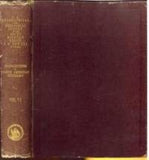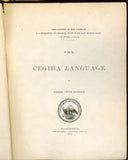Contributions to North American Ethnology, Volume VI: The Cegiha Language
Author: James Owen Dorsey (1848-1895)
Year: 1890
Publisher: Government Printing Office
Place: Washington, DC
Description:
xviii+794 pages with index. Quarto (11 3/4" x 9 1/2") bound in original publisher's maroon cloth with gilt lettering to spine and blind stamped edge rule to front cover. Contributions to North American Ethnology volume VI. (List of Publications of the Bureau of American Ethnology pg 49) First edition.
James Owen Dorsey was born October 31, 1848 in Baltimore, Maryland to Thomas Anderson Dorsey and Mary Sweetser Hance. He taught himself the Hebrew alphabet by the age of six and was able to read it fluently at the age of ten. In 1862, he entered Central High School in Baltimore, and later in 1867, attended the Protestant Episcopal Theological Seminary at Alexandria, Virginia. There he was ordained a deacon in 1871. Soon after he began working as a missionary in the Dakota Territory. He spent his time with the Ponca Indians, a Siouan tribe. He was able to learn their language in a short time, being able to speak well enough without an interpreter. In 1873, he came down with a serious illness while writing Ponca grammar and dictionaries, forcing him to return to Maryland. Upon his return, he contacted the Smithsonian Institution to have his writings published. Unfortunately, they were judged unprofessional. Dorsey spent the next five years at a parish in Maryland, at the end of this time he was sent to be an Ethnologist for a study with Major J.W. Powell. He went as an Ethnologist, and was to develop a grammar and dictionary of Ponca. He was sent to do two years of field work at the Omaha reservation in July of 1878. In 1879, the Bureau of American Ethnology was developed, and Dorsey became an expert on Siouan languages and tribes. Dorsey was the only missionary on staff at the BAE. After 1880, he spent time in Washington D.C. reflecting on his experiences with the Native Americans, particularly their language and culture. In 1883, he traveled to Canada to study the two Siouan languages, Tutelo and Quapaw. In 1885, he studied the linguistic groups of Oregon, a group he wasn't familiar with. His last year of field work was in 1892 where he spent two weeks in Louisiana. He spent that time with two of the last Biloxi speakers. Also, he traveled back to D.C. periodically to work with individual native speakers. His work contributed much to Powell's classification system for Native American languages. He contributed to the BAE's annual reports and wrote an 812 page treaty in the Omaha language. Not only did he write about the languages, he wrote about their dwellings, furniture, implements, kinship, and marriage arrangements. Dorsey was never formally educated in anthropology, but he was very good at recording the habits and changes in linguistics caused by age and outside contact. In his writings, he would describe the language instead of comparing it to western language. He wrote many reports translating or interpreting the languages of the Native Americans, such as: "Siouan Sociology (report for 1893-94)." He was very interested not only in the language, but also the culture. He supported the people of the northern plains and helped them write requests for improvements on the reservations. He was admired by many people, including Franz Boas, who thought Dorsey had deep insight into the culture of Native Americans. He had a passion for retaining their culture and always had a sense of his missionary work even while working for the bureau. He never married and died on February 4, 1895 in Washington D.C.
Condition:
Corners bumped, spine ends, corners, hinges and edges rubbed else about very good issued without jacket.









